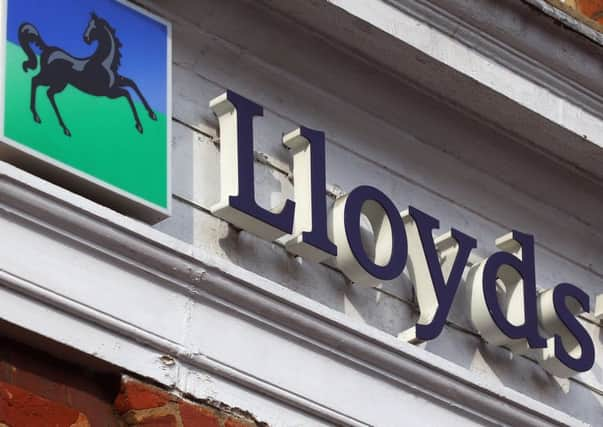Taxpayer-backed banks to report contrasting results


Royal Bank of Scotland, which is still 80 per cent owned by the state, is expected to turn in lower first-quarter profits on Thursday as it is hit by a stream of exceptional charges, including higher asset disposal costs.
Chief executive Ross McEwan is set to say the turnaround of the bank brought to the brink of liquidation by the financial crash of 2008 continues, but remains “a work in progress”.
Advertisement
Hide AdAdvertisement
Hide AdLloyds, now 21 per cent owned by the taxpayer after a further 1 per cent shares sell-down on Friday, is expected to have lifted profits on the back of the UK economic recovery.
Simon Willis, banking analyst at broker Daniel Stewart, said: “I think we will see this contrast between Lloyds and RBS for another year at the very least.
“RBS remains much less well down the road to recovery. Twelve months ago, many people were saying the horizon for RBS coming through all its issues was coming closer, but I don’t think this week’s update will show that to be the case.
“Lloyds, however, should have had a more enjoyable time of it again in the first three months of 2015.
“They have got their house in order, and they continue to benefit from the UK economic recovery, being a much bigger play on that recovery than RBS, even with the strategic refocusing at the latter.”
Analysts at Numis forecast that RBS will have seen statutory pre-tax profits fall 45 per cent to £904 million in Q1. McEwan is expected to reveal more big restructuring charges of about £700m as the bank continues to shrink the massive international footprint created under former boss Fred Goodwin.
Numis said revenues at the group’s much-shrunk investment bank will have fallen 27 per cent to £1.1 billion, as McEwan continues the wind-down of the operation started by immediate predecessor Stephen Hester.
The chief executive has said that he will cut the number of countries the investment bank operates in from 38 to 13.
Advertisement
Hide AdAdvertisement
Hide AdLast month RBS agreed the sale of the international arm of the Queen’s bank, Coutts, as part of its plan to focus on its UK operations. In the same month, it announced the sale of up to $3.7bn (£2.5bn) in shares in its US arm, Citizens, cutting its stake in the operation to 42 per cent.
At its February full-year results RBS also confirmed that Sir Howard Davies, the former head of the now defunct Financial Services Authority, will be its chairman from September.
He replaces Sir Philip Hampton, who is set to join GlaxoSmithKline.
Meanwhile, Lloyds is tipped to post a 16 per cent rise in quarterly profit to £2.1bn, with banking analysts expecting chief executive Antonio Horta-Osorio to say both bad debts and the net interest margin – the difference between what it charges borrowers and pays depositors – have improved.
However, analysts at Numis said Lloyds will also unveil a raft of new charges, including £640m of costs related to the sale of TSB and yet another payment protection insurance provision, this time of £500m.
Last month lender TSB, which was spun out of Lloyds in June, was sold to Spanish rival Sabadell for £1.7bn. Lloyds still owns half of TSB and will dispose of the remaining stake this year.
In February, the group paid a token dividend for the first time in the seven years since its state lifeline after announcing a four-fold rise in annual profits to £1.8bn.